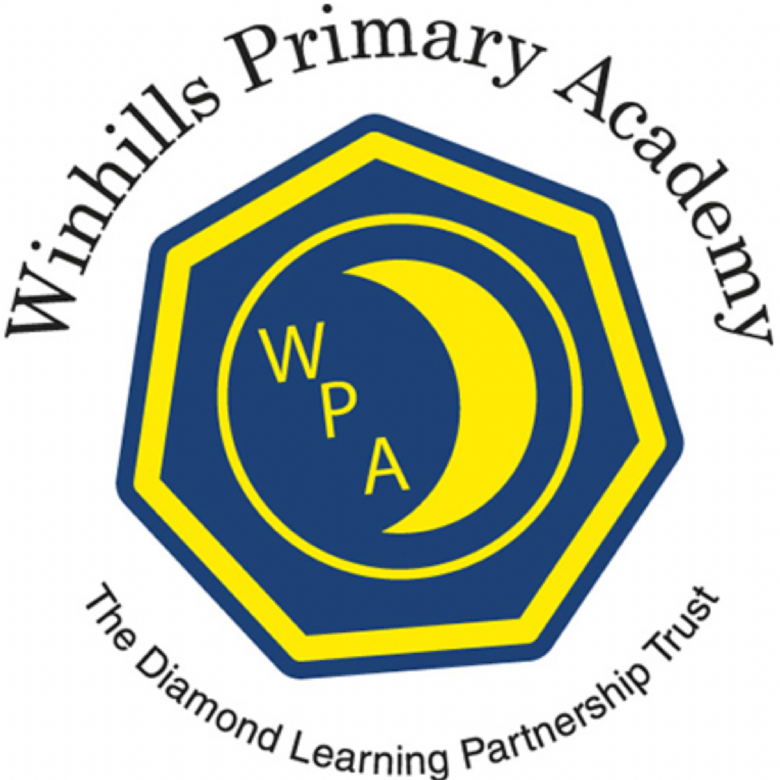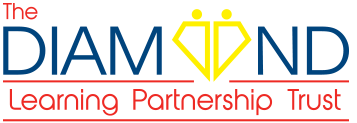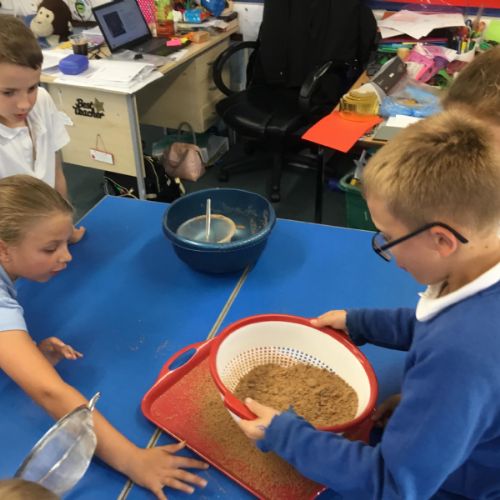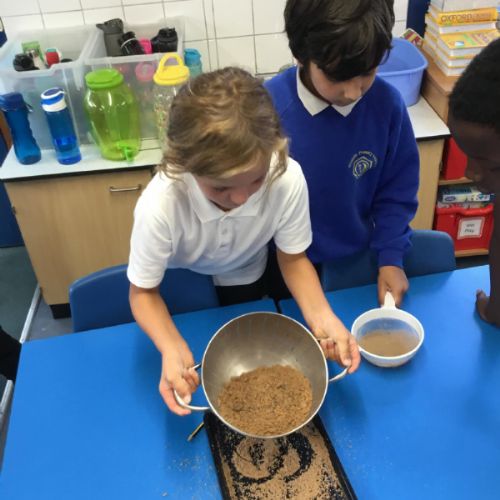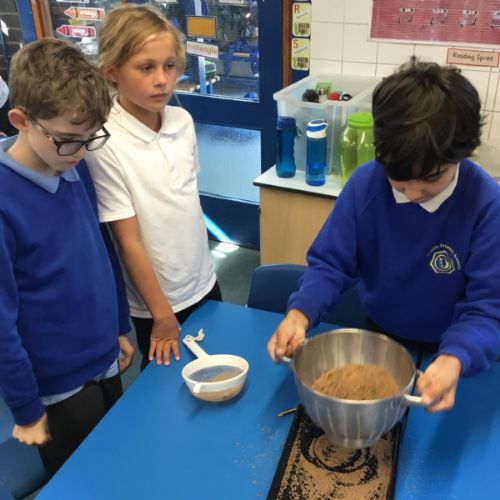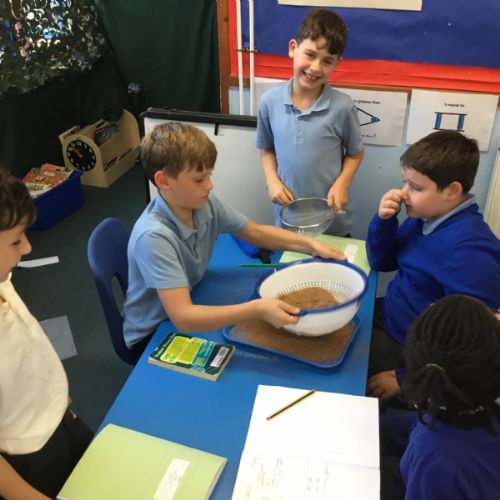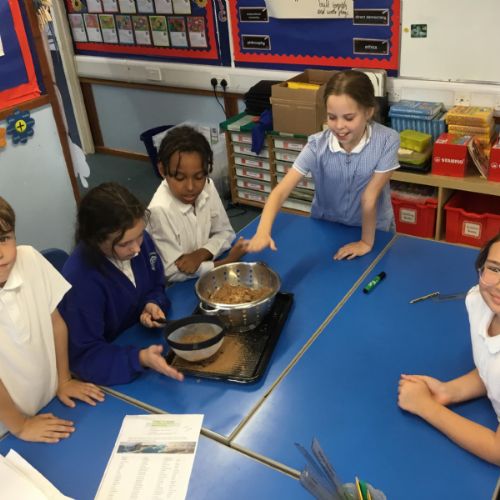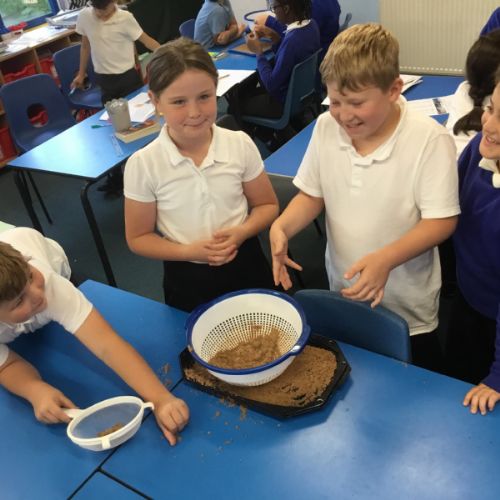Autumn Term
Information for parents and families
Knowledge Organisers to support with learning at home
- Science - Knowledge Organiser - Mixtures and Separation
- Science - Knowledge Organiser - Properties and Changes
- History - Knowledge Organiser - Greeks
- Geography - Knowledge Organiser - Energy
- Computing- Knowledge Organiser - Search Engines
- Art - Knowledge Organiser - Painting and Mixed Media
- Design Technology - Knowledge Organiser - Stuffed Toys
- Music - Knowledge Organiser - Dynamics, Pitch and Tempo
- PSHE - Knowledge Organiser - Wellbeing
Week Ending 29th November
In Maths, we finished our unit on multiplication and division by the children learning how to divide by 10, 100 and 1,000. We then started our new fraction unit. To begin the unit, the children created their own fraction walls and found fractions equivalent to unit fractions. The next day, they found equivalent fractions of non-unit fractions and finally finished the week by recognising equivalent fractions by using fraction walls and their timestables.
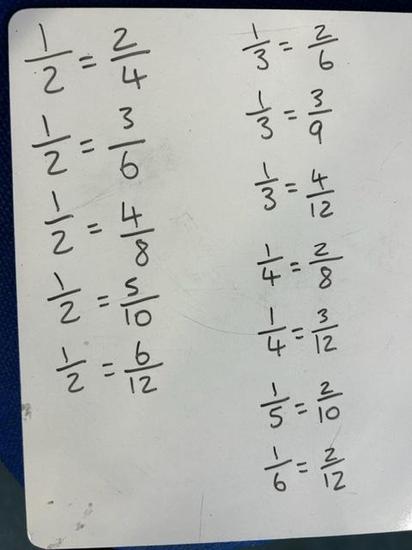
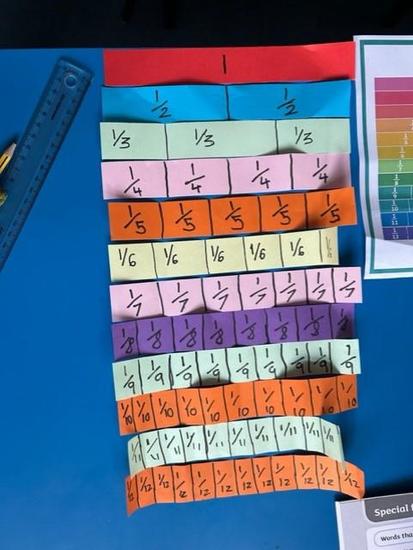
In English, the children edited their diaries which were absolutely fantastic! We then continued to read the next part of our story. Over the next couple of weeks, the children will be learning about interviews and thinking about the types of questions interviewers ask. They have had to think about the characters in the text and make inferences based on what they have read.
On Wednesday afternoon, we welcomed parents into school for a 'Christmas Craft' event. It was absolutely wonderful to see so many family members join their children to create a bauble (which is going to be displayed outside the front of the school) and other Christmas crafts. The school definitely looked like there had been a glitter explosion after but it was very fun!
In addition to all of this business, the children watched a pantomime in school on Tuesday afternoon, some children joined in the PTA craft night after school on Thursday, we had a Rocksteady workshop and we had the wonderful Gener8 assembly on Friday!
Next week is the last week of play rehearsals but wow does the play look amazing!
Week ending 22nd November
This week was assessment week so they children have been busy with their assessment papers. They have completed: spelling, grammar and punctuation, arithmetic, maths reasoning 1 and 2 and finally a reading paper.
However, during this busy time, we still managed to squeeze in some fantastic English lessons. The children learnt about relative clauses and wrote some fantastic sentences using them. They then planned their diary entries focussing on the key events and the features of a diary. To finish the week, the children wrote their diary entries which were fantastic! They really took their time to think about everything which needed to be included and what we had learnt over the past couple of weeks (relative clauses, show don't tell, figurative language and subordination).
Next week, they will edit their diaries to make them even better!
Week Ending 15th November
This has been a super busy and exciting week!
On Tuesday 12th, Year 5 and 6 children completed a mental health workshop all about emotional regulation. The children shared personal experiences (if they wanted to), joined in with discussions and gave strategies to support people who were feeling anxious. It was fantastic to listen to them all and see how much they had taken in from our PSHE lessons.
On Wednesday 13th, we welcomed parents into school to join us for 'Sums and Buns'. This was an event where parents could join their child in a half hour arithmetic session (in which we focused on addition and subtraction) and work with their child. The parents then had the opportunity to join staff in the hall for some lovely refreshments.
On Thursday 14th, KS2 went to the cinema to watch the film 'IF' for 'into the film festival'. The children really enjoyed the film and we have completed some wonderful activities at school around it.
In English, the children have read the first 2 chapters of 'Pugs of the Frozen North' and have enjoyed discussions around it. The children shared the key events with their peers and then inferred how the character was feeling during each event. They wrote some fantastic show don't tell sentences around these events and then following on from it, they used some wonderful subordination. These will then be used in their diary entries when they write them.
In Maths, the children learnt about square and cube numbers. Some children used their timestable knowledge and others used practical equipment to support their learning. At the end of the week, the children learnt how to multiply whole numbers by 10, 100 and 1,000.
The Christmas play is in full swing of rehearsals and the children are absolutely loving it! I am already so proud of how hard they have worked learning their lines and songs already!
Week Ending 8th November
In English, we have started our new text 'Pugs of the Frozen North'.
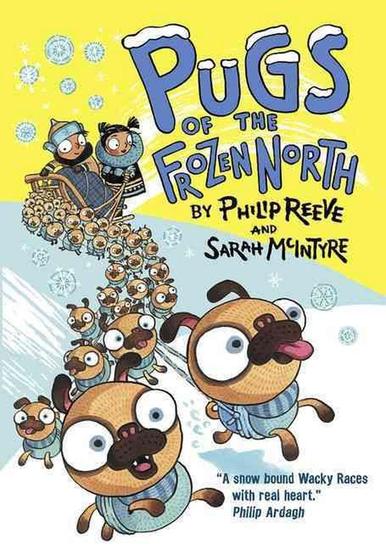
To begin our unit, the children made inferences about the story based on the front cover. They had to make a predictions, justify their opinions with evidence and generate questions about the book. They then read the first 2 pages of the book and had to identify the figurative language (personification, simile, alliteration, onomatopoeia and metaphors) which were used. They then had to write their own sentences using figurative language about the image in the text.
In Maths, we continued the learning from before half term on finding factors. The children found common factors of numbers by continuing to use factor bugs to help them. The children learnt about prime numbers (numbers with only 2 factors- 1 and itself) and finished the week identifying square numbers.
This week, we had a representative from living sport come into school and spend the morning with us running a dragon den workshop. The children worked in groups to design a new after school club which could be chosen by living sport. Living sport would then give the school £1000 to run the club and get any equipment needed. The children were fabulous and all presented their club brilliantly! They were so good that living sport chose 3 clubs to run- basketball, tri golf and yoga! Amazing!
More exciting news is the Christmas Season is upon us! We have started auditioning and rehearsing for our Christmas production 'No One Wraps Like An Elf!' The play is absolutly amazing and we are all super excited! We will be very busy over the next few weeks practicing for our production!
Week Ending 25th October
This week in English, the children learnt about conjunctive adverbs. The children identified conjunctive adverbs in sentences and learnt how to punctuate sentences containing conjunctive adverbs. They then corrected sentences which were written incorrectly. The children researched a Viking god (still based on Arthur and the Golden Rope) Thor or Odin. They then wrote a non-chronological report of their chosen god. The children had to include conjunctive adverbs, subordinating conjunctions and a range of sentence starters.
In Maths, the children learnt how to find factors of numbers. They had to use their prior knowledge of multiples and learnt how to draw a factor bug. They learnt that all numbers (other than 1) have at least 2 factors- 1 and itself. They also learnt that sometimes there is a repeated factor (square numbers).
In Science, the children began an observation experiment about evaporation. We looked at different salt flats and discussed how they are formed. We used recycled lids and poured a salt solution into them. Each lid represents a salt flat. We are going to leave them on the windowsill over half term and observe what happens during next half term.
Have a wonderful half term! Be safe with any fireworks and bonfires! Have a Happy Halloween!
Week Ending 18th October
In English, the children learnt how to punctuate and write direct speech. They had to think about the punctuation needed and we used the term 'a cheese and pickle sandwich' to help the children remember- the bread being the inverted comma, cheesy words, pickle for punctuation and finish with another bread (inverted comma). The children then extended this by saying it then needed a mouth (to eat the sandwich) which stood for the reporting clause (who was talking). I loved this idea! We then used the rest of the week to write the newspaper articles. The children had to use conjunctions, fronted adverbials, quotes (speech) and the features of a newspaper. The children finished the week by editing their newspapers.
In Maths, we started our unit of multiplication and division. We began the unit by learning about multiples. The children had to understand what a multiple is, spot patterns in multiples and understand that a number can be a multiple of more than one number. The children then followed this lesson by finding common multiples.
In History, the children identified and explained the achievements of the ancient Greeks. The children had to identify the Greek legacies and explain their impact. The children created a stamp which represented their legacy and wrote a paragraph to justify their choice.
In Science, the children identified the factors which affect the time it takes a substance to dissolve. The children mixed sugar cubes of water different temperatures to see how quickly it would dissolve. The children each had a role to play to make it a fair test. They found the hotter the water, the quicker the sugar dissolved.
We started the lesson by observing coloured dyes dissolving in water making a solution.
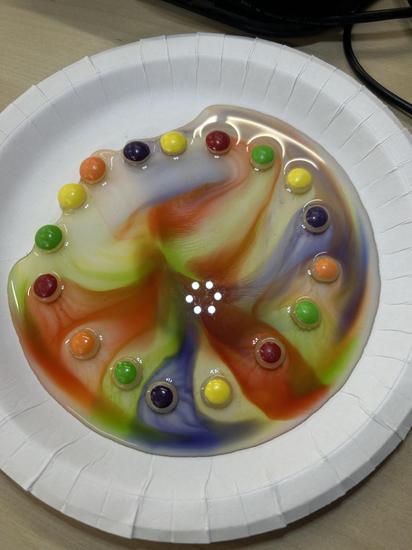
Week Ending 11th October
In English, the children recognised subordinating conjunctions and clauses in a piece of text. The children learnt how subordinate clauses are used within complex (multi-clause) sentences. They then followed onto this lesson to write their own complex sentences using subordinate clauses for their newspaper reports. The children were challenged to use subordination at the beginning and at the end of their sentences.
In Maths, we are continuing our unit of addition and subtraction. The children started the week by using the inverse operation to check their answers. To do this, the children had to understand the fact family and use this knowledge to check their own work. The children then used their knowledge of addition and subtraction to answer word problems (including 2 step problems).
In History, the children learnt about the Greek philosophers: Plato, Aristotle and Socrates. They learnt what philosophy is, took part in a philosophical discussion and created brilliant flap fact files about the philosophers. They finished the lesson by identifying and explaining the significance of the Greek philosophers and which they believed was most significant and why. One child said, 'I think Aristotle is the most important because modern Science wouldn't be what it is today!'
Week Ending 4th October
To begin our English unit, the children created a tool box of a newspaper report. They worked together to annotate a newspaper and highlight all of the features. Next, we looked at a range of fronted adverbials. We identified fronted adverbials of time, possibility, frequency and manner from a piece of text. To follow on from this lesson, the children wrote their own sentences using a fronted adverbial which they could use in their newspaper report. They were challenged to use a variety of fronted adverbials from different categories.
In Maths, the children started their addition and subtraction unit. They began the unit by using mental strategies. They had to use their knowledge of number bonds, unitise and count forwards and backwards in powers of 10. They then moved on to add and subtract numbers with more than 4 digits. They used the column method to add and subtract and needed to ensure they presented it correctly and exchanged when needed.
In Science, the children made solutions. They were able to describe solutions and explained how they could be identified. If a substance dissolved, it becomes a solution. They were able to name some common examples of solutions and observe their appearances. The children also became particles and moved around the hall. Some were salt particles and some were water particles. The water particles separated the solid salt particles which showed how it dissolved but didn't disappear.
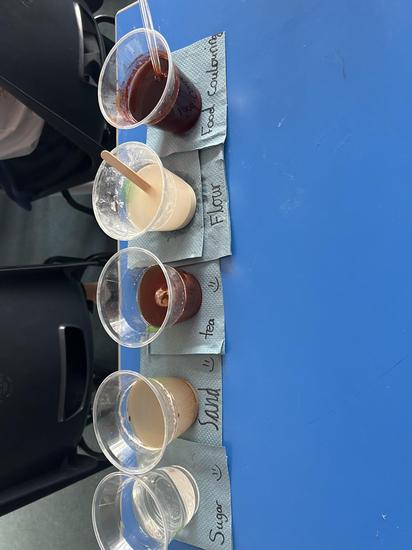
Week Ending 27th September
In English this week. the children innovated the ending of Arthur's journey across the sea. They had to follow the plot of the story but think about how they could change the ending to make it exciting. They wrote fantastic endings using the techniques we had learnt such as adjective sentence starters. The children then spent the rest of the week writing the story from the beginning including their innovated ending. They used techniques such as figurative language (expanded noun phrases, personification and similes), fronted adverbials, adjective sentence starters and wrote in cohesive paragraphs. They then finished the week by editing their work.
In Maths, the children partitioned numbers up to 1,000,000, explored number lines to 1,000,000 and compared and ordered numbers up to one million. We then finished the week by completing an orienteering activity where the children worked in pairs to find the questions around the hall and worked together to figure them out. This lesson was a recap on rounding numbers.
In History, the children identified the similarites and differences between Athens and Sparta. They were able to explain how the city states developed, compare them and explained which city state they would have rather lived in and why. They had to find the information which was displayed around the hall to make their comparisons. They focused on the features: location, government, education, warfare and children.
In Science, the children learnt about the process of filtering. The children described the term filtering and how it is used to separate mixtures. They were able to say when filtering should be used. During the lesson, the children made their own water filters. They had to choose materials to layer into the filter to try and trap the pieces of mixture and allow the water to pass through.
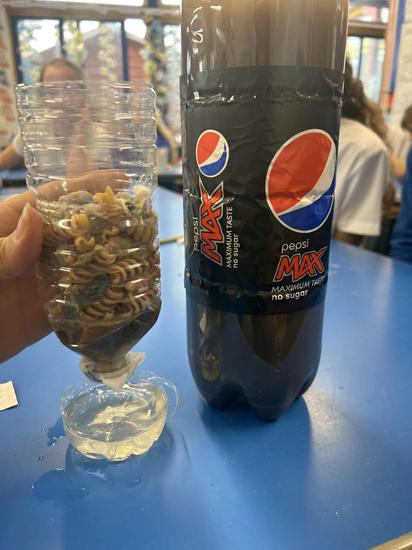
Science fun! We were gold prospectors!
Week Ending 20th September
During English this week, the children inferred how the character in our text felt and acted. Once they had identified how Arthur was feeling and acting, they wrote some fantastic outside, inside sentences (which is very tricky!) For example: 'As my whole body shook with terror, I crouched down to avoid the immense tentacles which had immerged from the water. Never in my life had I been so lonely and frightened. We then used what we had learnt so far in the unit to shared write some of the story. The children used fantastic figurative language to describe the setting as well as expanded adjective clauses to start their sentences when writing about the problem section. Next week, they will innovate and write their own!
In Maths, the children have continued exploring and learning about Place Value. This week, they learnt about the power of 10, identified numbers which were 100, 1000, 10000 and 100000 more or less than given numbers and partitioned numbers up to 1 million in a variety of ways.
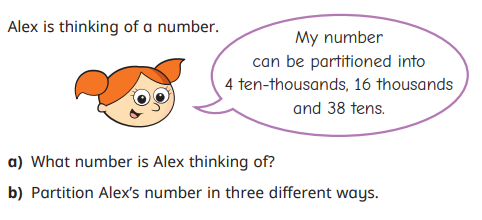
In Science, the children pretended to be prospectors collecting gold nuggets and flakes (glitter) from the sand. They had to separate the materials using the process of sieving using a colander and a sieve.
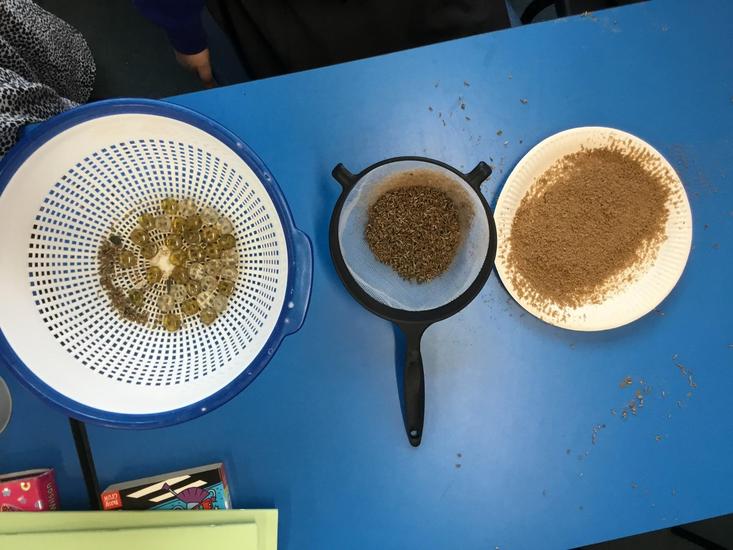
During History, the children researched Greek Gods and created their own fact files about a chosen god. They absolutely loved this lesson and really enjoyed sharing their information with each other.
In PSHE, the children have been learning about wellbeing. They have thought about their mindsets and learnt about fixed and growth mindsets. They were given some statements which were very fixed mindset and they had to challenge themselves to change the statement into growth mindsets. They then thought of something they found tricky and how they could adapt their mindset to help themselves.
In Music this week, Year 5 have looked at our unit of work exploring pitch, dynamics and textures. The children were asked to listen carefully to a piece of classical music by Mendelsohn. Without revealing the song title or any images related to the song, the children were asked to see what thoughts and pictures came to mind and wrote descriptive phrases or/and words to represent or depict the piece. After finding out what the piece of music was called - 'Fingal's Cave', the children then performed to the piece of music using their voice as an instrument.
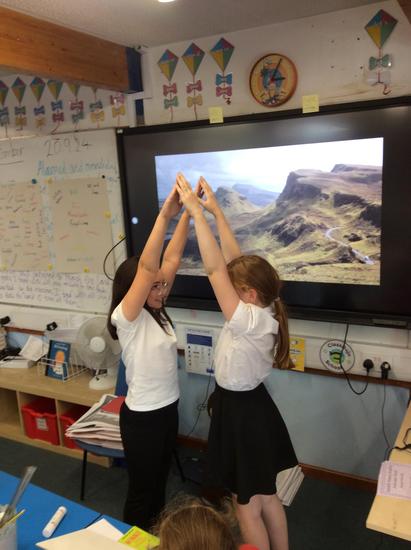
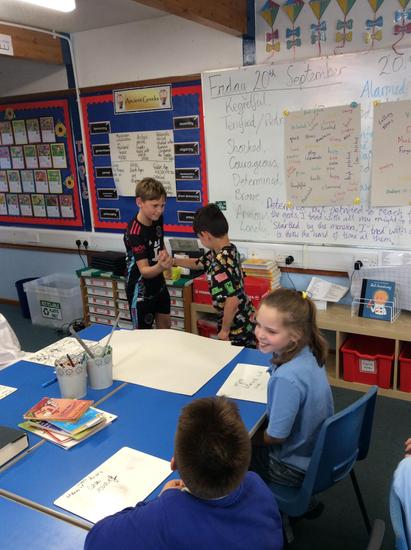
Week Ending 13th September
The children have settled into Year 5 brilliantly!
In English, we have started our text 'Arthur and the Golden Rope'. The children have retold the story through a story map, created an adventure story tool kit and have started focussing on vocabulary to describe the setting. The children thought about the word classes to identify things in Iceland and then wrote fantastic descriptive sentences using figurative language such as personification, similes and expanded noun phrases.
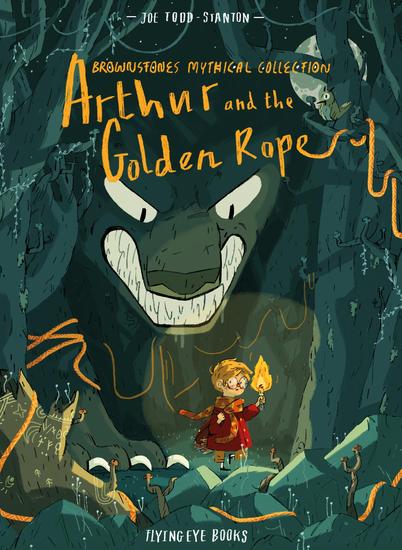
In Maths, we have begun our unit of place value. The children have been identifying, reading and exploring numbers up to 1,000,000. The have represented numbers in different ways, partitioned numbers in different ways and answered a mixture of problem solving and reasoning questions.
In Science, we have started our topic of 'Materials'. During the first lesson, the children explored mixtures. They learnt that a mixture is made up of 2 or more substances. In the lesson they created their own mixtures to meet a set of criteria and then in groups they researched different mixtures to identify the substances in them.
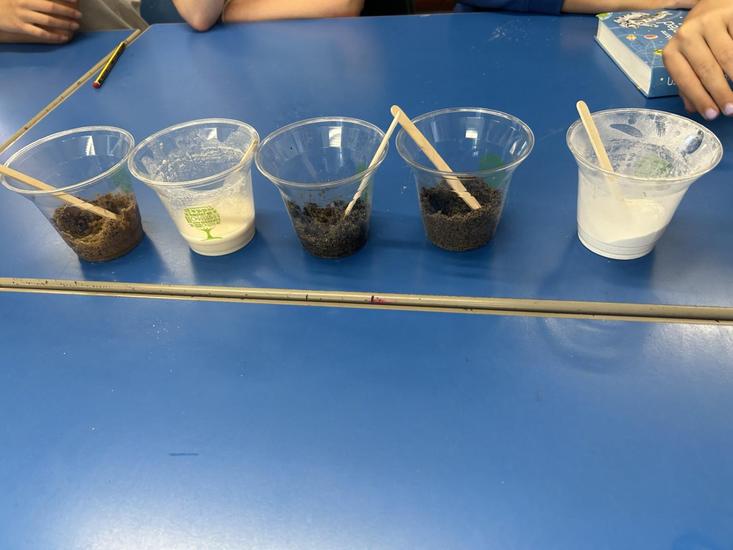
In History, we have started learning about the Ancient Greeks. To begin the topic, the children created a timeline of the period with dates and key facts. They also looked at a timeline online and identified other periods which were happening at the same time.
Week Ending 6th September
Welcome back to the Autumn Term, children are now in Year 5!!
We started this term with activities based on: expectations, rules, targets, successes, etc. We also spent time looking at Neil Armstrong (our inspirational figure - also the name of our class). Children completed researched information and wrote fact files on Neil Armstrong as well as completed some artwork. Children also spent some time in our school grounds for our 'Ground Force' morning as well as had their first PE lesson in UKS2!
